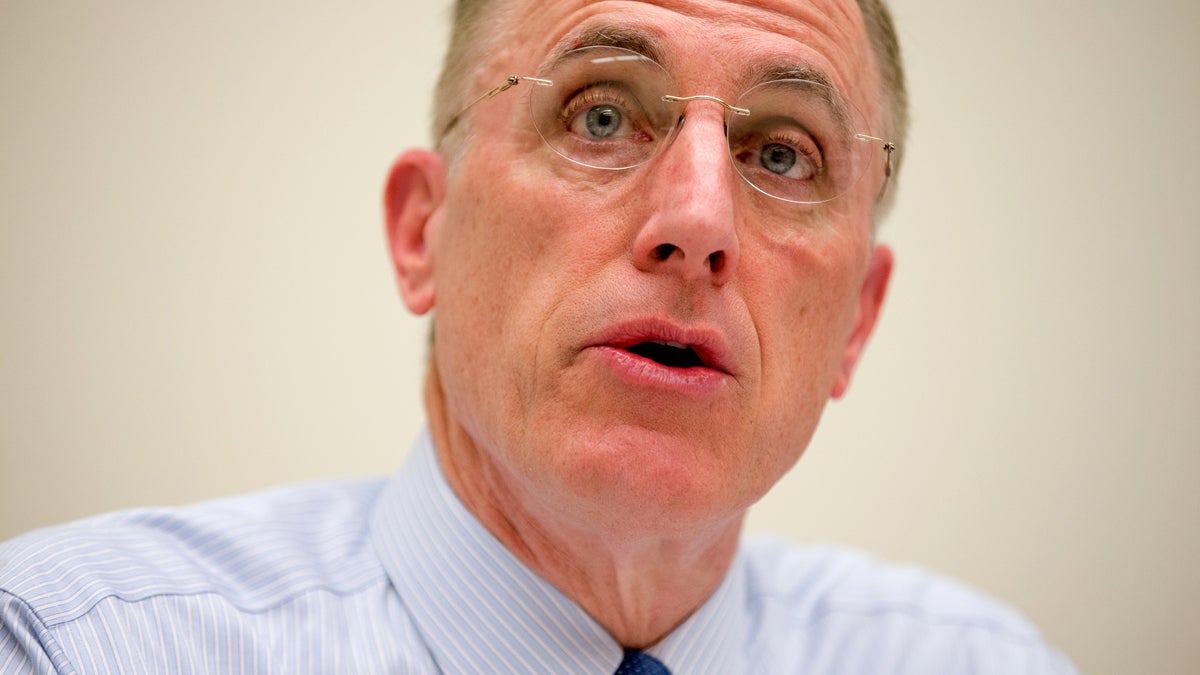Psychologist-congressman from Pittsburgh pushing mental health approach to mass shootings
Listen
Congressional Steel Caucus Chairman Rep. Tim Murphy, R-Pa. speaks on Capitol Hill in Washington, Thursday, March 26, 2015, during a hearing of the caucus to discuss the state of the U.S. steel industry. (Andrew Harnik/AP Photo)
U.S. Rep. Tim Murphy from suburban Pittsburgh remembers first hearing about the mass shooting at Oregon’s Umpqua Community College in October.
“Someone texted to me and I turned on the TV just a quick turn of the TV and I turned it on and saw that. I just sat down in my couch and wept and my chief came in and asked what’s wrong and I said here we go again, it happened again and I know the things in my bill which fix a lot of this definitely would,” Murphy said.
Since nine lost their lives in Oregon, more mass shootings have left families of victims and politicians scrambling to find a solution. Murphy believes he has the answer. He wants to give judges more power so they can force mentally ill people into outpatient treatment, while also giving caregivers more options for getting professional help for relatives who suffer violent episodes.
“This fella could have had treatment, there could have been better communication with the mother,” Murphy said. “There could have been better identification of risk. None of those things can happen in the current system and now so many people have lost their lives.”
Murphy says the current system is flawed because it prohibits Medicaid patients from seeing two doctors on the same day — that could block a general practice M.D. from referring someone to a psychiatrist immediately. He says federal rules limit where Medicaid patients can get treatment, sometimes delaying or preventing people from getting help.
“[My bill] recognizes that most peoples with mental illness are not violent but there a groups of people with severe mental illness who are not in treatment that are at risk for that and the current system blocks treatment from them,” Murphy said.
Murphy brings more than legislative expertise to the issue. As a psychologist, he has practiced mental health for 40 years. He holds the rank of a commander in the U.S. Naval Reserve where he still volunteers to treat soldiers suffering PTSD and traumatic brain injuries. Murphy says Democrat’s push on gun control is a distraction from what is really behind most mass shootings.
“With these gun issues, look I’m the only one here solely focused on treating mental illness because I know it and I know we have to deal with that,” Murphy said.
U.S. Rep. Frank Pallone (D-Central New Jersey) disagrees.
“That’s the thing that really disturbs me is that he keeps saying that he wants to move his bill and he doesn’t want to change his bill because it’s the answer to the gun violence,” said Pallone. “I mean that’s not true.”
He serves across from Murphy on a key House health subcommittee. Pallone supports parts of Murphy’s effort but says the biggest flaw is it doesn’t provide enough money to prevent people with mental illness from hitting a breaking point. Pallone also rejects claims it will decrease gun violence.
“To suggest that this is the way to solve the problem of mass murderers — I mean obviously one of the major concerns with gun violence is kind of trying to have restrictions you know reasonably restrictions on assault weapons and some of these other you know weapons that are used for these mass murders,” Pallone said.
After the recent terrorist attacks in Paris and San Bernardino, California, Democrats have turned their attention to banning people who are on the terrorist “no-fly” list from buying guns. Even as he supports mental health reform, U.S. Rep. Bill Pascrell (D-North Jersey) says the focus needs to be on gun-control.
“And for the Republican Party to not allow us even to debate, or discuss, or vote on [it] — what we should be doing about keeping guns away from potential from the terrorist who have potential evil deeds in mind it’s a disgrace,” said Pascrell. “There’s no reason for it. Is this how they think they’re going to protect the second amendment?”
But U.S. Rep. Pat Meehan, a Republican from Delaware County in Pennsylvania, is firmly behind Murphy’s effort. He says most mass shootings are carried out by mentally ill people.
“Mental health is clearly an element and so many of these matters and I think it’s prudent to try to see if there’s something we can do about it,” Meehan said.
Murphy’s bill was passed out of the health subcommittee this fall. It looks like it may get a vote in the new year because House Speaker Paul Ryan now supports it. Murphy is confident it would make a big difference if it becomes law.
“Our bill is a comprehensive change it’s not a tweak, it’s not a patch, it’s a comprehensive change that truly addresses mental illness,” Murphy said.
Even with the blessing of Speaker Ryan, Murphy’s bill still faces an uphill battle. But the Pittsburgh-area congressman is promising to continue being the loudest voice for mental health reform in 2016.
WHYY is your source for fact-based, in-depth journalism and information. As a nonprofit organization, we rely on financial support from readers like you. Please give today.

